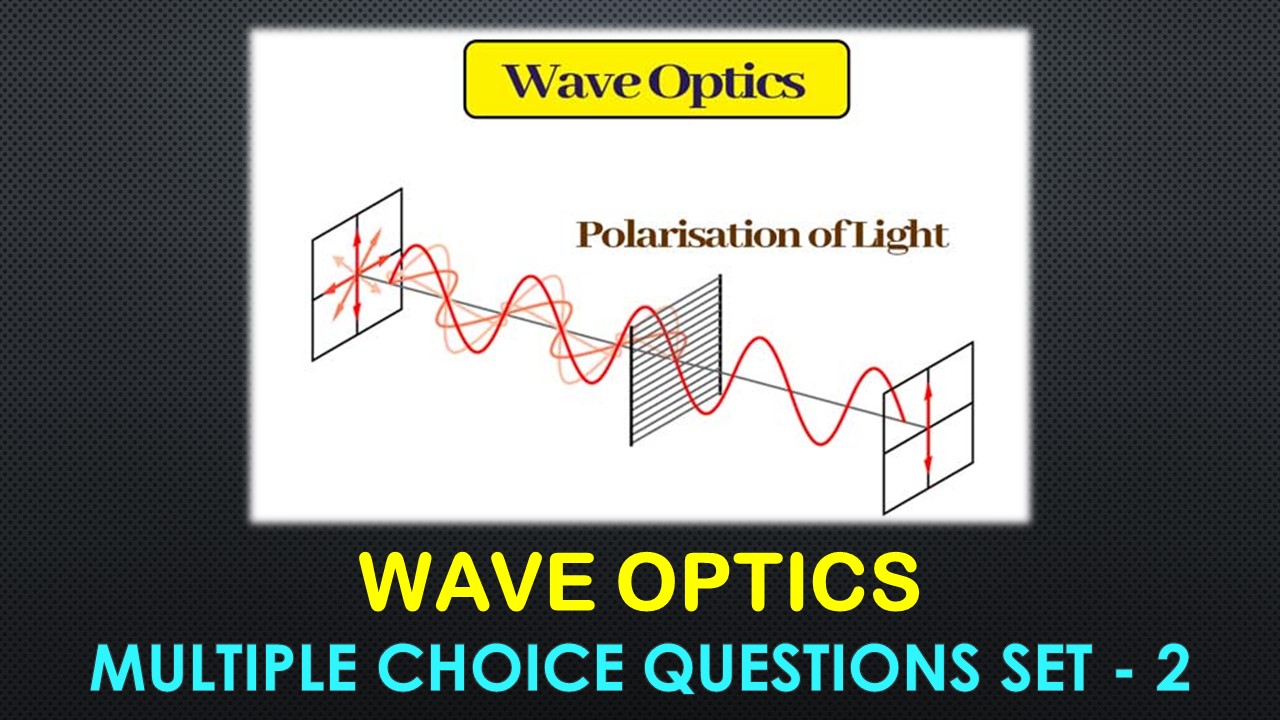CBSE Class 12 Wave Optics Multiple Choice Questions with Answers. MCQ Questions Class 12 Wave Optics with Answers Is Prepared Based on Latest Exam Pattern. Students can solve NCERT Class 12 Wave Optics MCQs with Answers to know their preparation level.
Students who are searching for NCERT MCQ Questions for Class 12 Wave Optics with Answers are compiled here to get good practice on all fundamentals. Know your preparation level on MCQ Questions for Class 12 Wave Optics with Answers. You can also verify your answers from our provided MCQ Class 12 Wave Optics with Answers. So, ace up your preparation with MCQ of Class 12 Physics Examinations.
MCQ Questions Class 12 Wave Optics with Answers - Set - 2
Question 1:
The frequency of e.m. wave which is best suited to observe a particle of radius 3 × 10-4 cm is of the order of
(a) 1014
(b) 1013
(c) 1012
(d) 1015
Correct Answer – (D)
Question 2 :
A diffraction pattern is obtained by using a beam of red light. What will happen if the red light is replaced by the blue light.
(a) No change will take place.
(b) Bands become broader and farther apart.
(c) Bands disappear
(d) Diffraction bands become narrower and crowded.
Correct Answer – (D)
Question 3 :
Two waves, originating from sources S1 and S2 having zero phase difference and common wave length λ, will show completely destructive interference at a point Pif (S2P – S1P) is
(a) (11/2)λ
(b) 2λ
(c) 5λ
(d) (3/4)λ
Correct Answer – (A)
Question 4 :
If n represents the order of a half period zone, the area of this zone is nearly proportional to nm. where m is equal to
(a) 1
(b) 1/2
(c) 2
(d) zero
Correct Answer – (D)
Question 5 :
Which of the following establishes the transverse nature of light.
(a) polarisation
(b) interference
(c) Diffraction
(d) refraction
Correct Answer – (A)
MCQ Questions Class 12 Wave Optics with Answers
Question 6 :
Interference takes place due to
(a) Amplitude change
(b) Velocity change
(c) Intensity
(d) Phase difference.
Correct Answer – (D)
Question 7 :
The principle of super position in wave motion tells that in a motion in which two or more waves are simultaneously producing their displacement in a particle, then the resultant:
(a) amplitude is the sum of the individual amplitudes.
(b) amplitude is the difference of the individual amplitudes.
(c) displacement is the vector sum of the individual displacements.
(d) none of these
Correct Answer – (C)
Question 8 :
Two coherent monochromatic light beams of intensities I and 4I are superimposed. The maximum and minimum possible intensities in the resulting beam are
(a) 9I and I
(b) 5I and I
(c) 9I and 3I
(d) 5I and 3I
Correct Answer – (A)
Question 9 :
Light appears to travel in straight line since
(a) Its wavelength is very large.
(b) Its wavelength is very small.
(c) It is absorbed by atmosphere.
(d) none of these
Correct Answer – (B)
Question 10 :
The condition for observing Fraunhoffer diffraction from a single slit is that the light wavefront incident on the slit should be:
(a) spherical
(b) cylinderical
(c) plane
(d) none of these
Correct Answer – (C)
- NCERT Solutions Class 11 Chemistry Chapter 1 : Some Basic Concepts of Chemistry
- NCERT Solutions Class 11 Chemistry Chapter 2 : Structure Of The Atom
- NCERT Solutions Class 11 Chemistry Chapter 3 : Classification of Elements and Periodicity in Properties
- NCERT Solutions Class 11 Chemistry Chapter 4 : Chemical Bonding and Molecular Structure
- NCERT Solutions Class 11 Chemistry Chapter 5 : States of Matter
- NCERT Solutions Class 11 Chemistry Chapter 6 : Thermodynamics
- NCERT Solutions Class 11 Chemistry Chapter 7 : Equilibrium
- NCERT Solutions Class 11 Chemistry Chapter 8 : Redox Reactions
- NCERT Solutions Class 11 Chemistry Chapter 9 : Hydrogen
- NCERT Solutions Class 11 Chemistry Chapter 10 : The s-Block Elements
- NCERT Solutions Class 11 Chemistry Chapter 11 : The p-Block Elements
- NCERT Solutions Class 11 Chemistry Chapter 12 : Organic Chemistry: Some Basic Principles and Techniques
- NCERT Solutions Class 11 Chemistry Chapter 13 : Hydrocarbons
- NCERT Solutions Class 11 Chemistry Chapter 14 : Environmental Chemistry




